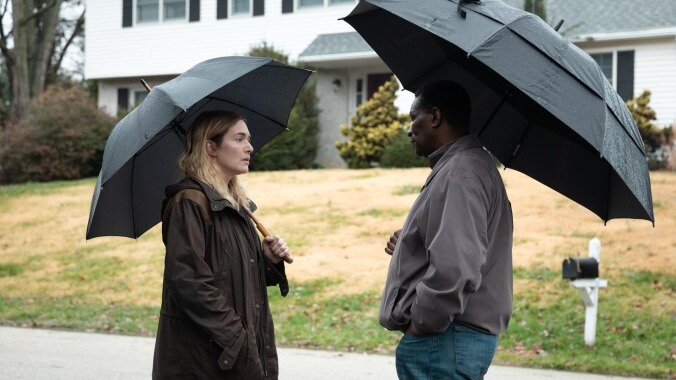The sad truth is that Mare Sheehan was never going to make it to the conclusion of the Erin McMenamin case and be lauded as a tireless hero cop. She was never going to get a redemptive arc in which a new solve casts a positive light on her past police work. No one was going to tell her that surely, the detective that busted her hump solving Erin’s murder didn’t bring just as much self-ruinous dedication to the Katie Bailey case too. No matter how amazing a detective Mare is, none of that was in the cards.
Mare’s superiors had lost faith in her. Colin Zabel, as collegial and deferent as he is, is still an underqualified man sent to supervise Mare’s superior work. Despite a solid reputation built on his work on a similar murder case, Colin betrays his inexperience in practically every conversation with Mare. If this is the guy the county brought in to supervise, they either think very highly of him or not that highly of her. Add to this the growing list of inconvenient intersections between Erin McMenamin and damn near Mare’s entire family, and the case had grown too unwieldy for Mare to handle.
But even as the conclusion of “Enter Number Two” might have been inevitable, the journey to it was far from predictable and truly heartbreaking. Mare’s now off the case, not because of any professional misstep, but rather a shocking personal transgression. And it all happens incredibly fast. Mere minutes pass between the scene in which Mare eyes the packets of heroin she smuggled out of the evidence locker and the one in which Chief Carter is insistent they speak in the rain lest she confuse his visit for a friendly one. By the time they’re whispering under umbrellas, he’s already pieced together the ugly truth of Carrie’s arrest on drug charges, and only wants to collect Mare’s badge and gun and offer her a lifeline out of pity.
Maybe it’s just the emotional impact of that great, mournful final shot from the rearview of the chief’s car, but something feels slightly unfair about the whole thing. Not unfair to Mare (who did an awful, awful thing whatever her intentions) but to the audience. It’s a quibble, but structurally I would have loved a bit more space between Mare’s life-altering decision and the consequences of it. That said, as the plot continues to accelerate, maybe there’s not simply enough space to put stuff. Mare Of Easttown is spinning a whole lot of plates, but that’s to be expected of a seven-episode limited series that spent its first hour setting up the chessboard.
For one thing, Dylan Hinchey is alive, having barely escaped death after being shot twice in the back by Erin’s angry father. Kenny admits to the crime immediately and appears to take quite a bit of pride in his act of retributive justice. But Dylan may not ever walk again, or look at his son the same way again after learning the rumors about Frank and Erin. Of course, Dylan remains a suspect for more reasons than can be counted on one hand.
Frank, for his part, declares his innocence when confronted by Mare about his lie and willingly offers himself to the police for questioning and DNA testing. Assuming the DNA test excludes Frank from fathering the child and his decent alibi holds up, Frank is no longer the surest bet for Erin’s murder. It still makes zero sense that such an innocent and noble story couldn’t have been shared with Mare sooner, so I haven’t fully taken my eye off Frank. He’s nervous about something or other.
But the “Number Two” of the episode’s title presumably refers to Deacon Mark Burton, the priest of the well-attended Saint Michael’s Parish, who had moving words about dealing with grief in a sermon following Erin’s death. He’s the last person Erin called according to her cell records, and the good deacon apparently forgot to mention the brief call to the parishioner investigating her murder. Mare brings up that oversight when she and Colin interview Deacon Mark about their conversations, and whether he had considered the ramifications of quality time with a minor given “everything that’s going on with the church.”
The Catholic Church’s reputation for shielding sexual predators comes up again, this time when an anonymous tip-line caller suggests further investigation into Deacon Mark’s recent transfer from another parish. As anyone who’s ever watched Spotlight (another great accent-heavy procedural) can attest, that transfer is not good news. The Catholic Church’s institutional practice of shuttling predatory priests from one church to another rather than rooting them out casts a dark shadow over someone with a recent, unexplained transfer. Of course, these are the least suspicious things about Deacon Mark. He dodges a second conversation with Mare and Colin, presumably to give him enough time to chuck Erin’s missing bike into a river.
Were the detective anyone else but Mare, I might suggest these considerations are someone else’s problem since Mare’s terrible plan to gain custody of Drew backfired with the force of a comet. As he’s throwing Mare’s professional future into question, Chief Carter makes a special point of mentioning the Erin McMenamin case by name and telling her to leave it alone. But in one of many great scenes in this episode, Mare demonstrates why that will be nearly impossible for her to do.
Mare and Colin are called out to a park after some kids stumble upon the finger Erin lost attempting to shield herself from the killer’s bullets. The new crime scene is a full 13 miles from the creek Erin’s body was found in, and there are traces of her blood throughout the area. At Mare’s insistence, Colin cashes in some goodwill with the county and summons a half-dozen dogs trained to sniff out firearm discharge. She puts on a master class in detective work as she follows up the K-9’s discoveries with some bloodhound work of her own. Within minutes, she’s located a bullet fragment in a tree that was previously missed by everyone else who combed the park. She’s good at this stuff, and she takes it very, very seriously.
Mare does absolutely meticulous police work because police work is the only part of her life she’s been able to successfully predict, having grown up idolizing her cop father. It’s the only place she feels truly comfortable and in her element. That’s why Mare bristles when anyone suggests she didn’t go far enough to investigate Katie Bailey’s disappearance. And it’s the same reason she’ll inevitably find ways to work the case without any jurisdiction, even though doing so could ruin the case entirely. Mare’s got a bullet in her now, one fired from her own gun only to bounce off Carrie and lodge in her vape-weathered lungs. But a lady still has to breathe, y’know?
Stray observations
- We get some more layers of Mare’s story during her date with Richard, and I’m curious as to how honest she’ll be with him about her current predicament.
- This is a strong episode for the legendary Jean Smart, who gets a lot to chew on between Helen’s explosive fight with Mare and hilarious, flirty interrogation of Richard.
- Let’s not forget Siobhan, who is working on a documentary (podcast?) about Kevin’s death and has a romantic subplot brewing with a college radio DJ. Also, I think Androgynous might be my favorite television show band since Crucifictorious.
- Safe to assume Frank and Faye will have a longer-than-planned engagement?
- Mare, after Father Mark describes himself as a mere conduit: “Just so we’re all clear, was it you on the phone with Erin or was it Christ himself?”
- I adored the Pawnee-like subplot between the Carrolls and their emo teen neighbor, who will always be referred to here as “the Lahey boy.” I’m still trying to figure out if Mare did the right thing in deleting that footage, and I’m leaning toward yes even as other decisions Mare makes don’t make as much sense.
- It’s crazy adorable that Drew wound up naming the turtle after his father.



 Keep scrolling for more great stories.
Keep scrolling for more great stories.